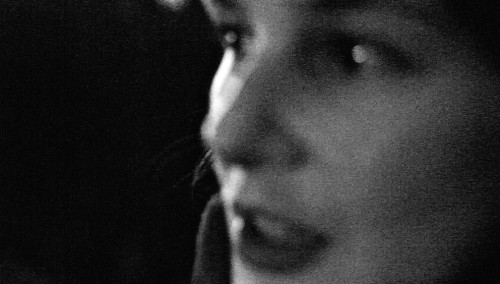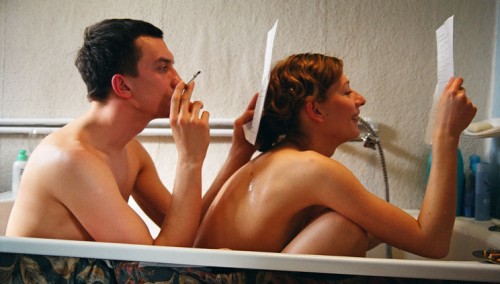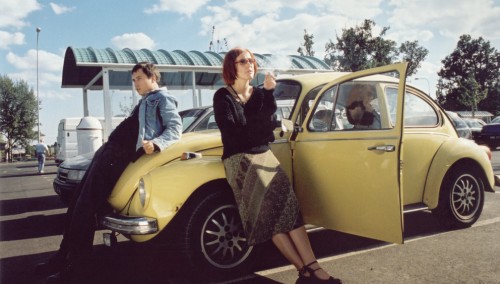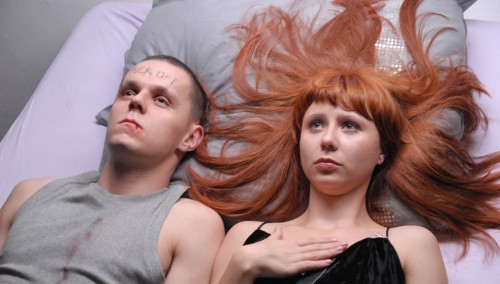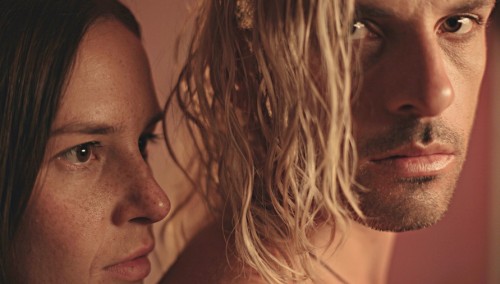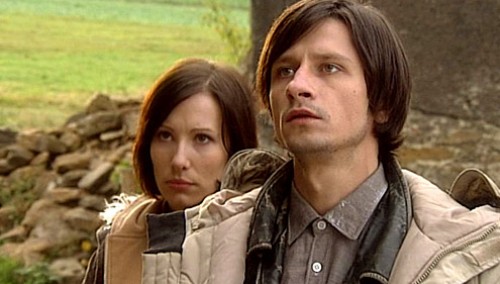Biography
Przemysław Wojcieszek, born 1974 in Poland, is a film and theater director and screenwriter. He studied journalism and Polish literature in Wrocław and Kraków before writing the script for Witold Adamek's film Monday in 1998. In 1999 Wojcieszek debuted as a filmmaker with Kill The m All. Louder Than Bombs was presented at Karlovy Vary International Film Festival and was screened at the 2002 Slamdance Film Festival in Utah. By 2004 he had already begun working in theater. Made in Poland marked Wojcieszek's debut both as a playwright and as a theatrical director. The Perfe ct Afternoon was shown in the Forum section of Berlinale and the New York Polish Film Festival in 2006. The Berlinale Forum also presented Wojcieszek's Made in Poland and Secret in 2010 and 2012 respectively. Przemysław Wojcieszek is a leading representative of Polish independent cinema.Interview
Views from a distance – Przemysław WOJCIESZEK on Polish ARTHOUSEFILM, unconventional narratives and the role of messianism in political culture.
(The interview was conducted by Bernd Buder in Berlin in December 2012)
You did not study film but journalism and Polish literature
I really badly wanted to leave my parent’s house when I was 18 years old. I spent all my youth in the suburbs of Wrocław so I was basically commuting there by train every day, and I always felt this need to live in a big city and to be independent. Once I finished high school, I went straight to Kraków, the second-largest city in Poland, to study Polish literature. After one semester, I knew that this was not my cup of tea. I was travelling, looking for some part-time work, I spent several months in Sweden where part of my family lives, and I worked there. So I came home with a crazy amount of money, I rented an apartment in Kraków and found a job – I was this person at the cinema checking tickets. I actually had the chance to watch films on a big screen again, and it was great. I decided to write which was the only thing I could do without money and contacts. I wrote a kind of treatment, for which I got a scholarship. It was called Monday. This script was turned into a movie within one year, it helped me a lot. I was no anonymous person anymore, I was in the closing credits, I had already become a screenwriter. I did not like the movie, and so I decided to shoot movies by myself. I wrote two more scripts, and I shot the first one, Kill the m all, I shot it independently within 7 days for next to nothing.
Kill them all is already a good example for your early filmmaking where you worked with the actors as an ensemble. How do you work with the actors?
It changed a lot in the last few years. I spent some time doing theatre exclusively. After the movie The Perfe ct Afternoon I really thought I would quit cinema forever because I was so frustrated with all those compromises, the lack of possibilities, the lack of financing, the fact that I could not do what I wanted to do. At that time cinema was, at least in Poland, very conservative, so you had to have a lot of money for a film. You had to make a movie through all those official channels of production – big producers, big rental companies. So I thought maybe to make theatre. I spent 6 years doing exclusively this. It gave me a lot, in respect of working with actors and working on the script and a general disregard for conventional storytelling I hold to this day. When I was shooting my first films, I tended to be very obsessive and controlling. I wanted to write the script as precisely as possible. The theatre taught me to be more flexible, more sensitive to what actors say and more wary of what you can do to a narrative structure. Moreover theatre tought me that 90% of the stories can be told with a maximum of 12 actors, and 90% of those stories can be told with a maximum of 5 actors. 90% of the 5-actors-stories can be done with just 3. I enjoy quite a lot to work with small casts. Last time, I had 3 people, now, for this Berlin thing, I have only two actresses. And I still have a lot of work building these characters and balancing a relationship between them. When you have a small cast, a handful of people, you can devote all your time to them, they know that everyone has a real important role in this. You can think more about the structure, the style, the visual side.
You once used the term “post-dramatic cinema”
That’s what I love, actually.
Which means, you avoid linear story-lines?
Actually, I am following the story lines quite well on paper, but I am trying to open the story as much as I can in various stages of production. To get any funding from anyone, you have to present a script which has to be decent. You don't get funds for vague ideas, it doesn't happen. So, you have to come up with a script. And more importantly you should know quite well what are you making a film about, why are you doing this, why it has to be done. And the better you know it, the more changes you can make during the shooting. You have to know very well what’s behind this whole mess. I’m trying to be very well-prepared for the shooting, and I change a lot – in Secret we cut out most of the dialogues. I tried to limit the dialogue as much as I could. We also turned many narrative sequences into still images. We turned information into emotions, a certain mood. That's my style now. However, it was really precisely scripted, but I had this whole idea in my head after 5 versions, so I was shooting without a script. I always do. And I am trying to open it, and destroy it and alter it as much as I can. I hate conventional story-telling. I am jealous what theatre came to, they really do brilliant things in the theatre, and they don't care about being true to literature, being true to any written source. Cinema gets cheaper and cheaper every year, but it's still very expensive, so you have at least to care about the fact that you have to squeeze your work into 20 shooting days.
In your first films, there was still a slightly optimistic subtone, which in Made in Poland became more angry. Do you think there was a change due to the political shift of the respective period, the dawning of the Kaczyński brothers' government?
Maybe it's a change in me, but Poles are, in general, completely obsessed with themselves. They are not interested in anything else but themselves. If you meet any Pole, anywhere, it may be here, in Berlin, but it may be in Australia as well, the only thing, that really touches him, that really hurts him or makes him happy is what another Pole says about him. He doesn't care about anything else in the world. It's one of the distinct features of our culture, that is deeply schizophrenic, extremely inward, subconsciously paranoic. I am spending more and more time in Berlin now, so I am not exposed to Polish media, I don't watch Polish TV , I only read about what’s happening in Poland on some websites. I am in this no-land now, in a no-space where I don't belong to a local culture yet and I still get some news from Poland but from a distance. It is very interesting because from the distance you see it better. It's more striking. You mentioned Kaczyński: he's a skillful, cynical politician playing with these obsessions. But if you look at the whole country from the distance, everyone is a victim of this paranoia as long as it persists. Maybe because I became a little bit frustrated with that, my films go in this direction. I felt I had to change environment. I had to go somewhere and look at it from a distance.
Mentioning “Looking from a distance”, a recent Polish film with a similar title comes to my mind.
I must say I like this film a lot. It had a huge recognition in the world but it was absolutely ignored in Poland. It's symptomatic, because this film was totally independent, too. It was financed by the filmmaker, who is a very famous painter, and his wife. It deals with Polish anti-Semitism in a mild, metaphorical way, but actually no one really cared about it, because it's a fine example of an arthouse cinema which is almost non-existent in Poland. The film resorts to Bruno Dumont's narrative style and virtually no one understands. But at the same time, we had a theatrical release of a film called Pokłosie (Aftermath), shot by a local filmmaker who was a kind of provincial Tarantino offshoot in the 90ies, and it's a ridiculously bad movie about Polish-Jewish relations, that bad, that you stop laughing at some point and actually cannot believe, that it's happening for real. But it's totally straightforward, so it started a media frenzy and everyone had to take a position. It got the regular bashing from the right, so a few decent critics from the left started to defend it, despite the fact, that it's really exploitative and bad. Actually, it's a good example of our collective paranoia. That's why I had to escape to Prenzlauer Berg one night. (laughter). Unfortunately, this uninventive, kitschy straightforward storytelling has a strong tradition in Poland. Our cinema was always a part of a social commentary, no one cared about the language, no one cared about aesthetics.
In your earlier work, you refer to a lot of music. Louder than bombs is the title of an album by The Smiths
The new one will be entitled How to Disappear Completely from a Radiohead song. I am obsessed with pop culture. As a teenager, I was obsessed with British-American pop culture, mostly music. That was something which was readily available, You did not have to go to the cinema to have it. You did not have to leave home to get some music. In the Communist era, because we did not have any copyright law then, public radio was playing the entire albums. The best DJs in the 80s were playing the albums as a whole, we were taping them off the radio. 4AD -albums, Factory Records stuff, U2, Depeche Mode. For my generation, the music was everything. The music of the 80ies and 90ies is kind of a blueprint, so with every new thing I hear I refer to it. Since I am speaking about Polish cinema and something which is happening in Polish culture in general, I have a lot of problems with it, because it's totally self-centered, obsessed with the history, obsessed with this crazy Polish belief that we're on a mission from God – in Poland its called Messianism – and the whole symbolic thinking that comes with it and is pretty much alive. In Polish literature, Romanticism is the most important period, and everything emanates from it. Of course, we had many decadent fin-de-siècle era poets, we had modernism, we earnestly copied everything from the West. Still, Romanticism is the source of any serious thinking about Poles and Poland and the place of this country on the map of Europe and our assumed civilizational mission. And a kind of hostility to Russians and Germans, because we are supposed to be more civilized, more devout, we suffered much more, we are depositaries of lost values for Eastern and Western Europe. It is very deeply rooted in the society. When we have this kind of a catastrophy like the one that happened two years ago when our president died in an air crash, it's never an accident, it's mythologized already, it's a creeping religious cult as it must have happened for a reason. It's just another Messianic sacrifice linked to many other from the past. You know 30% of the society do already believe it was an assassination. Of course, some politicians exploit it for a cynical short-term gain, but they're that effective as this symbolic thinking is a part of our collective perception. We may pretend, we are a secular, modern society, but in fact we still believe in abracadabra. And it's really easy to demonize Germans, Russians, actually all neighbours. You know I was always taught, that Germans equal nazis. Always. It was hammered to my head, when I was a child. And now I live in Berlin. I can laugh about it now, but coming here was and still is a liberating experience. I'm killing my demons here. Yes, I have problems with this culture, and that’s why I was craving for this Anglo- American pop during high school.
How do you construct your characters in your films?
When starting out, it came from my life observations. In the first three movies, the characters were taken from real life, those family characters, people I more or less knew. It had a lot of traces in my family, like I told you I was travelling around Europe. I have family in Sweden, I have family in England. The first film was a kind of tribute to that, I know all those types quite well. And the second one, Down Colorful Hill. I spent all my childhood in such a place, it was always pretty magical and pretty disturbing. Small village in the Sudety mountains. Inhabited by Poles just after the war. Most of these people expected Germans to be back in 10 or 20 years, no one knew what would happen, a third war maybe. I remember everything was nice and beautiful and great, but everything was also decaying, everything was falling apart because no one cared about anything. Because people were sure that at some point, they will return to the East, when they came from. It started to change in late 80s, when we regained full independence and people realized it's the end of history for a moment and took care of their places. Now its pretty much o.k., but you still see a lot of decay, a lot of destroyed homes. For me, its very sentimental. I like to return there. I remember a lot of these types, these Wild West characters who were resettled there, to beautiful German houses, but who actually hated them, waiting for years to leave to the East. Now its quite fancy to go there. You have artistic communities in an any given village. You can have Chai Latte and try some yoga. But back then, in the 80s, it was something different. Like a wild West.
Some words about your work in progress project
I am spending the vast part of my life in Berlin now, I am planning to be here until the shooting, which means I am going to live here until May. I am shooting a kind of diary. I am trying not to be egocentric, it's more about my conversation with people living here, my perspective on being in a totally new place without any connections. I thought I am a filmmaker and I have a camera, so I should do it. If the film is a language, you should simply fucking use it every day, regardless if you have the money or the approval from someone or not. I was never shooting my daily life as I thought it's too banal and not interesting, but as I changed environment, and I feel like a stranger and like a spectator, I am trying to document that moment in my life. I have decided to shoot my life. It's gonna be a work in progress forever.
(Bernd Buder is a freelance journalist and curator at the Cottbus Film Festival, team member “International Forum of New Cinema” at the Berlinale and since 2011 director of the east west co-production market “connecting cottbus”)


